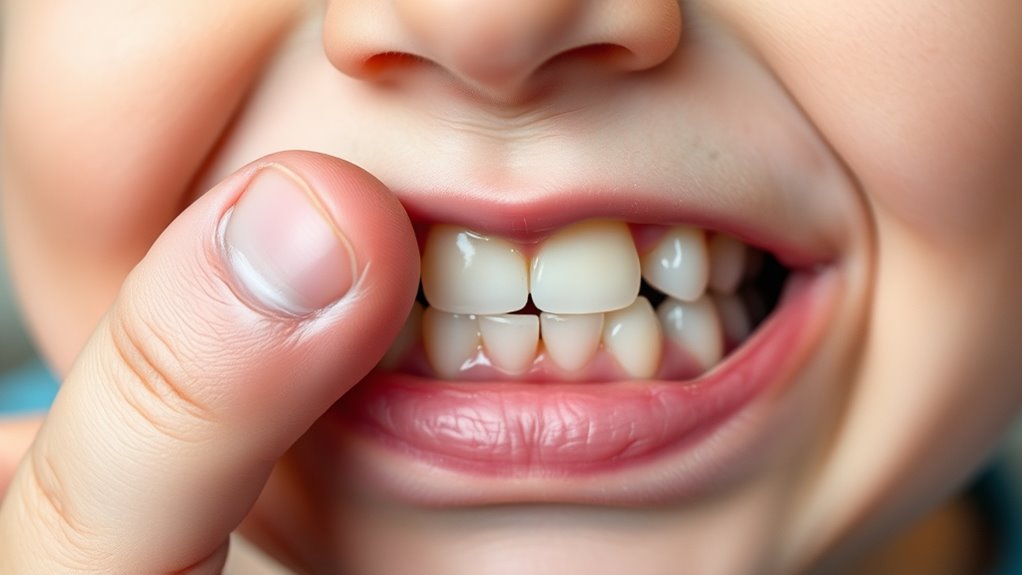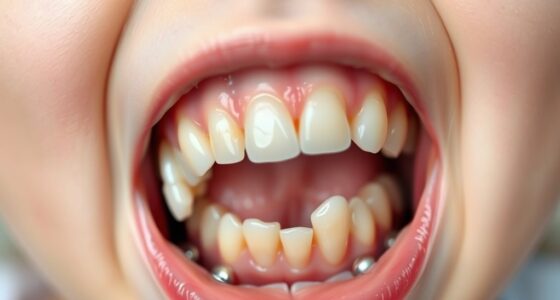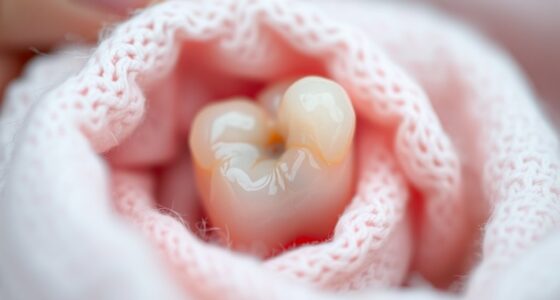Thumb sucking can cause misaligned teeth and bite problems like overbite, open bite, or crossbite if it persists beyond early childhood. It pushes teeth and jaw development off track, leading to crooked teeth, crowded spaces, and uneven growth. Early intervention by your dentist helps prevent long-term issues and promotes healthy positioning. To understand more about how to manage this habit and protect your child’s dental health, keep exploring the details ahead.
Key Takeaways
- Thumb sucking can cause misaligned teeth and bite problems like overbite, open bite, and crossbite.
- Persistent thumb sucking during growth increases risks of crooked teeth, crowded teeth, and irregular jaw development.
- It may lead to protrusion of upper front teeth and malocclusion, affecting chewing and speech.
- Early intervention and behavioral strategies can prevent long-term dental malformations caused by thumb sucking.
- Regular dental check-ups help monitor development and guide treatment to minimize orthodontic issues.
How Thumb Sucking Affects Dental Development

Thumb sucking applies constant pressure on your teeth and palate, which can lead to misaligned teeth and bite issues like overbite and open bite. This habit influences dental development by pushing the upper jaw forward and tilting the lower front teeth inward, disrupting normal growth. Automation technologies enable scalability and flexibility, which can impact the pace of dental development and intervention strategies. As you continue thumb sucking, your oral health may suffer, increasing the risk of crooked, crowded teeth and irregular jaw growth. During the eruption of your permanent teeth, persistent thumb sucking heightens the chances of dental malformations, including open bites and other bite issues. The severity of these problems depends on how long and vigorously you suck your thumb. Early cessation can help prevent long-term dental malformations and support healthier jaw growth and proper alignment of your teeth. Additionally, understanding the dental development process can help caregivers recognize early signs of malocclusion and seek timely orthodontic intervention.
Common Bite Problems Linked to Thumb Sucking
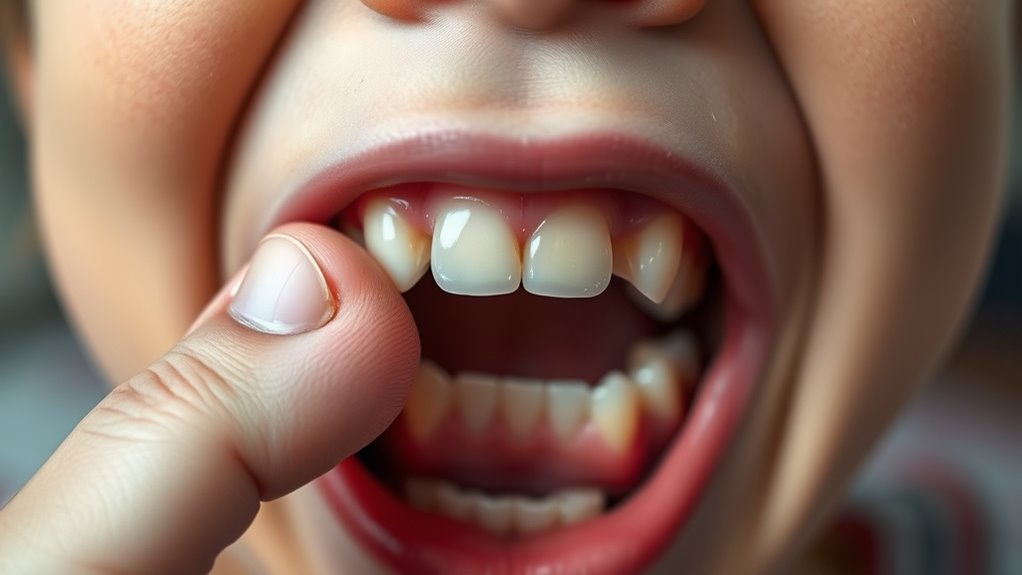
Thumb sucking can lead to various bite problems that affect your child’s dental health. You might notice issues like open bites, where the front teeth don’t meet, or an overjet, with the upper teeth protruding too far. Additionally, thumb sucking can cause crossbites, where the upper back teeth sit behind the lower ones during biting. Sustainable fashion is increasingly influencing the choices parents make for eco-friendly and durable dental products.
Overbite Development
When a child sucks their thumb vigorously or for an extended period, it can push the upper front teeth forward, leading to an overbite. This thumb sucking habit applies constant pressure on the upper front teeth, causing them to protrude and creating a malocclusion. An overbite results when the upper teeth extend notably over the lower teeth, which can impact bite function and appearance. Persistent habits like thumb sucking during early childhood increase the risk of developing dental problems that may require orthodontic correction later. The protrusion of the upper teeth can also contribute to other bite issues. Early cessation of thumb sucking helps prevent or lessen the severity of an overbite, promoting healthier dental alignment and reducing the need for extensive orthodontic treatment in the future. Additionally, understanding the resources and tools available for addressing such habits can be beneficial in guiding children towards healthier oral development. Maintaining awareness of dental development milestones can also assist parents in identifying potential issues early on. Recognizing the importance of proper oral habits can further support healthy dental growth and prevent long-term complications. Promoting positive habits and providing appropriate orthodontic interventions can be effective in correcting bite problems caused by thumb sucking. Incorporating professional dental guidance can help monitor progress and ensure proper development over time.
Crossbite Formation
Prolonged thumb sucking can cause the upper back teeth to shift behind the lower teeth, resulting in a posterior crossbite. This crossbite formation occurs when thumb sucking exerts pressure on the palate, affecting jaw growth and disrupting proper teeth alignment. According to standard store hours, these effects can interfere with dental development, leading to an uneven bite. Persistent oral habits during critical growth periods increase the risk of developing a posterior crossbite. Additionally, the continuous pressure can influence dental arch development, further complicating orthodontic issues. If left unaddressed, it can cause uneven wear and chewing difficulties. Early intervention is vital to prevent or correct crossbite formation caused by thumb sucking.
Open Bite Risks
Have you ever noticed a gap between the front teeth that doesn’t close? This could be an open bite caused by thumb sucking. Persistent thumb sucking exerts pressure on the teeth and palate, disrupting proper teeth alignment and leading to an anterior open bite. This bite malformation results in the upper and lower front teeth not meeting, which can cause difficulties biting and chewing. The severity depends on how long and how often you or your child engage in thumb sucking. Left untreated, open bites can develop into ongoing dental problems. Early intervention is essential to prevent persistent thumb sucking from causing extensive bite malformations and other dental issues. Addressing thumb sucking habits early helps protect children’s teeth and promotes healthier bite development. Proper brewing techniques can also influence overall oral health by minimizing irritations caused by uneven pressure. Recognizing habitual behaviors that contribute to dental malformations is key to preventing long-term issues. Additionally, understanding how electric power generation impacts dental appliances can help ensure a comprehensive approach to oral health management.
When to Seek Professional Help for Dental Issues
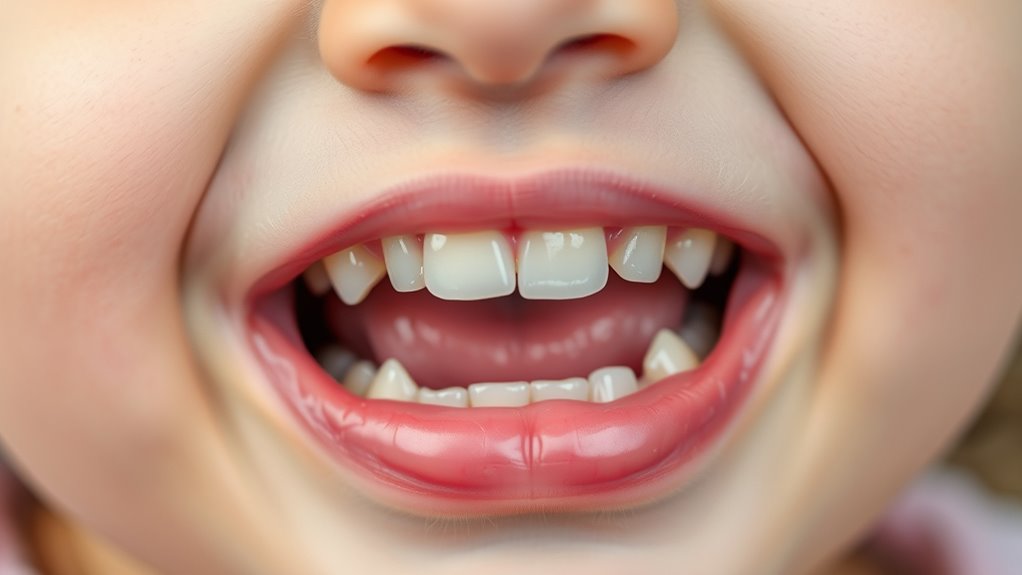
You should consult a dental professional if thumb sucking leads to noticeable misalignment of your child’s front teeth by age 4 or if bite issues like open bite or overjet develop. Persistent thumb sucking can cause dental issues such as malocclusion, which may require early intervention and orthodontic treatment. Regular dental visits starting at age 1 help monitor your child’s teeth and identify potential problems early. Additionally, addressing emotional factors that contribute to thumb sucking can be crucial, as emotional well-being can play a role in developing healthier habits. An understanding of supportive strategies can assist both parents and children in overcoming the habit. Seek professional help if thumb sucking continues vigorously beyond age 5, as it increases the risk of jaw misalignment and bite problems. Dentists can detect structural changes caused by thumb sucking and recommend appropriate strategies to prevent or correct issues. Prompt evaluation ensures your child’s teeth develop properly and avoids more complex dental issues later on. Recognizing early signs of dental misalignment can facilitate timely intervention and minimize long-term impacts. Furthermore, understanding the impact on jaw growth can help in planning effective treatment options.
Strategies to Encourage Children to Stop Thumb Sucking
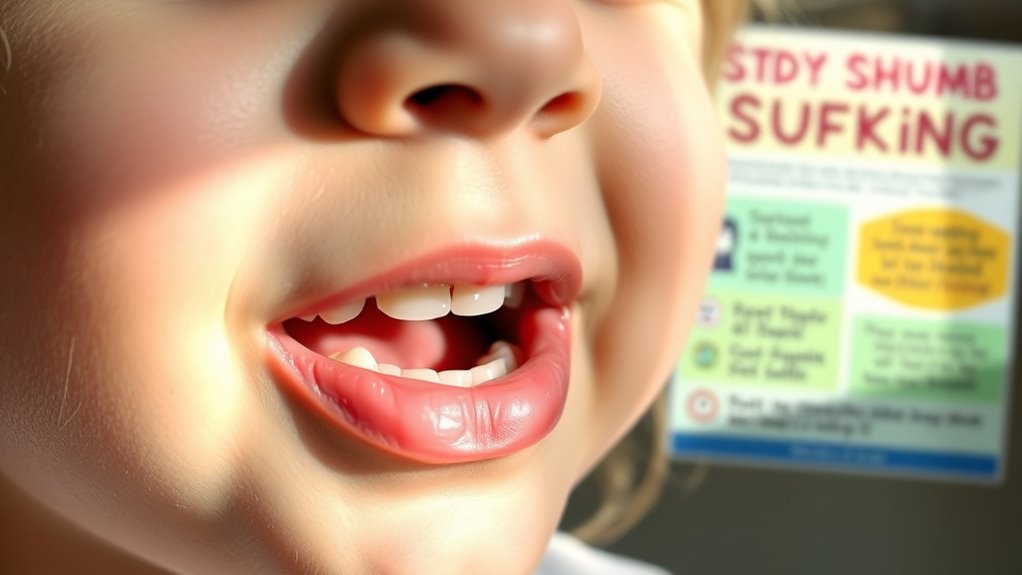
Encouraging children to stop thumb sucking involves using positive reinforcement and identifying underlying triggers. Praise or reward charts motivate children to break the habit, making progress feel rewarding. Incorporating aesthetic wall organization strategies can also help create a calm environment that reduces stress and the need for comfort habits. Look for triggers like boredom or stress, and address them to reduce the desire to thumb suck. Offering alternative comfort objects, such as stuffed animals or toys, helps distract children and provides comfort without thumb sucking. Gentle reminders and physical barriers, like thumb guards, can support them in breaking the habit. Pediatric dentists can offer tailored strategies and reinforce encouragement, making the process easier. Additionally, choosing a preppy dog name or other suitable pet name can help foster a positive environment at home, which may indirectly support behavioral changes in children. Recognizing the importance of attention in behavior modification can further enhance the effectiveness of these strategies by encouraging consistent focus on positive behaviors. Incorporating behavioral therapy techniques can also provide additional support and structure for children struggling to stop thumb sucking. Integrating skin care tips, such as using gentle products or soothing routines, can also promote overall well-being and reduce stress-related habits.
Long-Term Dental Risks of Persistent Thumb Sucking
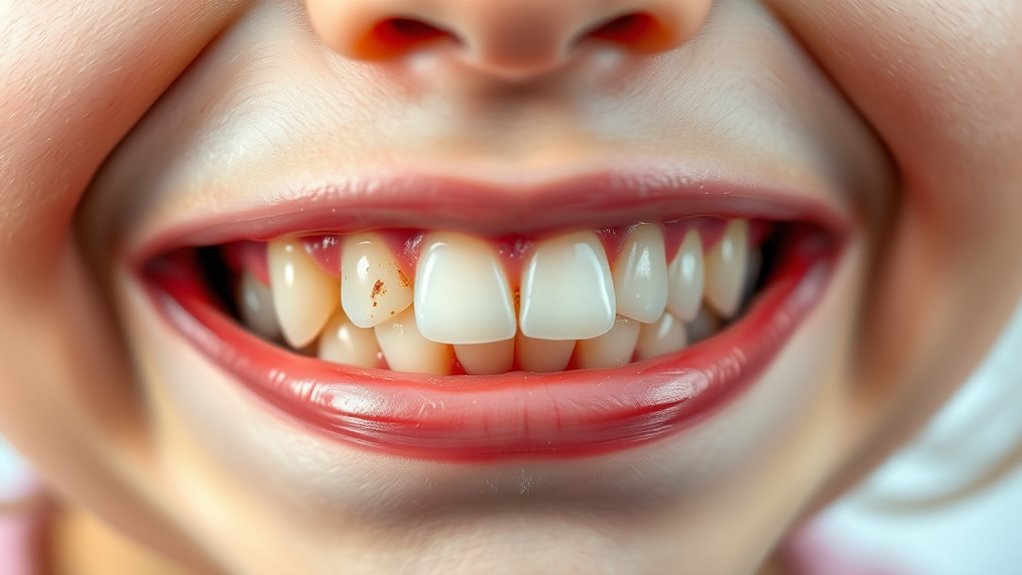
Persistent thumb sucking can lead to serious long-term dental problems, especially if the habit continues beyond early childhood. The constant thumb pressure can cause an overbite, with upper front teeth protruding over the lower teeth. It may also result in misaligned teeth, narrow palate, and malocclusion, which often require orthodontic treatment later. Automation’s role in business intelligence can further complicate the diagnosis and treatment planning for these dental issues, emphasizing the importance of early intervention. Continued thumb sucking beyond age 5 increases the risk of bite problems like anterior open bite and posterior crossbite. Additionally, persistent thumb pressure can alter jaw growth and shape, leading to crooked, crowded teeth and gaps. Over time, these issues affect dental alignment, making it harder to chew and speak properly. Addressing these risks early can help prevent complex orthodontic needs in the future.
The Role of Pediatric Dentistry in Managing Thumb Sucking Effects
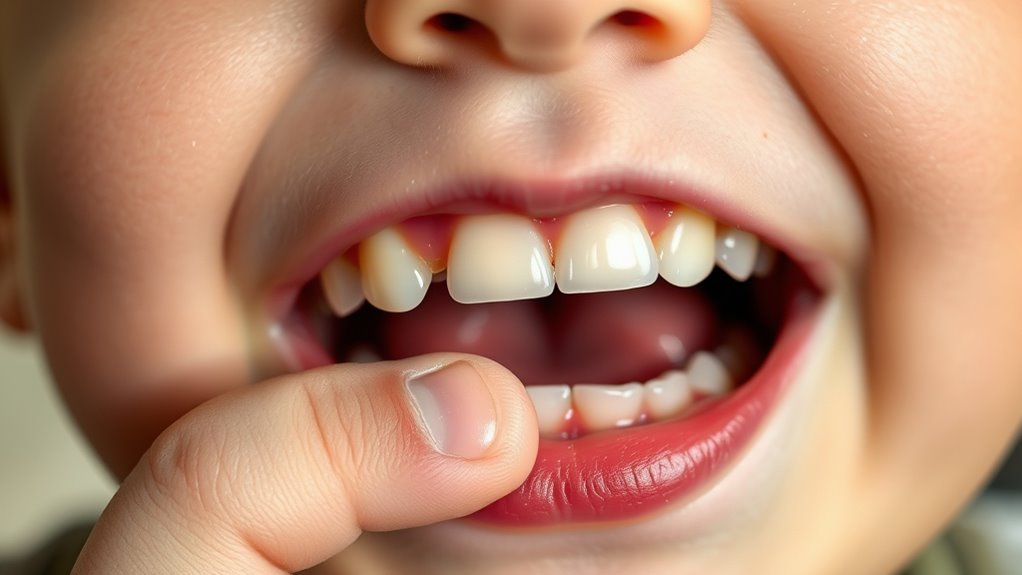
Pediatric dentists play a vital role in managing the effects of thumb sucking on your child’s dental health. Through regular dental check-ups, they monitor your child’s dental development and detect early signs of teeth alignment issues or malocclusion caused by thumb sucking.
They provide personalized advice and behavioral strategies to help your child stop thumb sucking before it impacts permanent teeth. In some cases, pediatric dentists use orthodontic appliances or thumb shields to prevent further dental damage during ongoing habits.
Early intervention is key to reducing the need for extensive orthodontic treatment later in life. Dentists also educate parents on effective reinforcement techniques and when to seek professional help, ensuring your child’s dental health remains on track.
Frequently Asked Questions
What Is Worse for Teeth, Pacifier or Thumb?
You ask whether a pacifier or thumb is worse for teeth.
Generally, thumb sucking tends to be more damaging because it applies focused, vigorous pressure on your teeth and palate, increasing the risk of misalignment and bite issues.
Pacifiers, especially if orthodontically designed, are usually less harmful and easier to stop.
The key is how long and how intensely you suck, but overall, prolonged thumb sucking poses a higher risk.
Conclusion
Remember, thumb sucking may seem harmless now, but it can shape your child’s future smile. Like a sculptor carving stone, early habits carve lasting dental patterns—some beautiful, others not. By staying attentive and seeking professional advice when needed, you can guide your child toward healthier habits. Don’t let this small act cast a big shadow on their smile; with proactive steps, you can help shape a bright, confident future.
